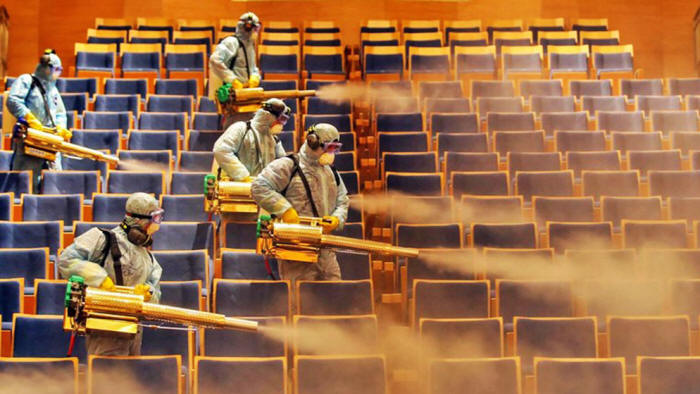|
from RT Website
FILE PHOTO: Members of a rescue team spray disinfectant at Shengjing Grand Theater in preparation for its reopening on May 31, 2020 in Shenyang, Liaoning Province, China. © Yu Haiyang / China News Service via Getty Images
The
Covid-19 'pandemic' reshaped not only our daily
lives but also the global socio-political landscape, marking the end
of one era and the start of another.
The last Days
of Peace
Swedish teenager Greta Thunberg, then at the height of her fame, dominated the spotlight as a symbol of left-leaning environmental activism.
Meanwhile, US President Donald Trump, the quintessential anti-globalist, stood in stark contrast, delivering his "America First" message to a room of cautious listeners.
Amid these musings, a growing shadow loomed:
Few at Davos grasped the gravity of the
situation, and most viewed the virus solely through the lens of its
potential impact on China's economy, which the world relied on.
In the years that
followed, the agenda was dominated first by the 'pandemic', then by a
series of escalating armed conflicts, from Eastern Europe to the
Middle East.
For the first time in decades, the foundational freedoms of global integration - movement of people, goods, services, and capital - were significantly disrupted.
The liberal world order that had thrived on globalization faced its greatest test.
For years, globalization had been seen as an inevitable, almost natural process - beyond the control of individual states.
For all the upheaval, however, the world did not collapse.
This resilience shattered the narrative that liberal globalization was the pinnacle of human achievement.
It became apparent that this era, like others before it, was finite...!
Countries faced unprecedented stress, while governments used the crisis to experiment with new forms of governance and control.
Measures that might have faced resistance in normal times were justified in the name of public health. The crisis also paved the way for strategic recalibrations.
For example,
Perhaps most importantly, the 'pandemic' demonstrated that the world could function without the established global order.
This
realization undermined the notion of a single, unified international
system and laid the groundwork for a more fragmented,
multipolar
world.
The "every nation for itself" approach that dominated the early months of the crisis further eroded trust in global norms and fueled the legitimization of national self-interest as a guiding principle.
As a result, the global balance of power
became more diffuse, with no single pole exerting overwhelming
influence.
Instead of a few dominant poles, we now see a collection of significant players of varying strength, interacting in complex and situational ways.
Shorter supply chains proved more resilient, and neighboring states became increasingly vital to each other's political and economic stability.
This trend is evident in regions such as,
As military and political tensions rise, neighboring states are
playing a greater role than distant powers, reshaping the dynamics
of influence.
Liberal Globalization is
Over
Just as the 'pandemic' severed global connections out of necessity, geopolitical decisions in 2022 further fractured the international order.
Yet, once again,
Attempts to isolate Russia economically and politically have not succeeded in dismantling the global system.
The much-touted 'rules-based order' of liberal globalization has given way to a more pragmatic, albeit chaotic, approach to international relations.
While this may reduce the predictability of international relations, it also opens the door to greater flexibility and resilience.
The world is now in a period of transition, defined by uncertainty and competition.
The liberal-globalist narrative that dominated the
late 20th century has been replaced by a more fragmented,
multipolar
reality.
The 'pandemic' was the catalyst for this transformation, but it was only the beginning.
The next chapter of international relations will
be defined by how states adapt to this new reality - and whether
they can find common ground in an increasingly divided world.
|


